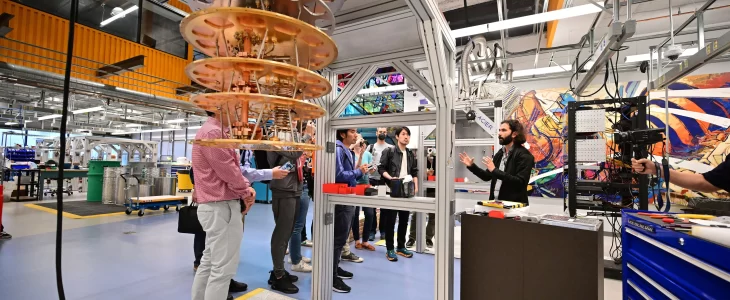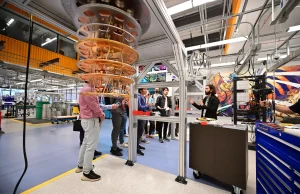
Understanding Quantum Computing: Design, Construction, and Future Prospects
Quantum computing represents a revolutionary advancement in the field of computation, offering the potential to solve problems that are currently intractable for classical computers. This comprehensive article delves into the intricate design and construction of quantum computers, explores how they will be made in the future, discusses their potential applications, examines the integration of artificial intelligence (AI) with quantum computing, and highlights the key companies pioneering this cutting-edge technology, including the role of KES Systems.
Introduction to Quantum Computing
Quantum computing leverages the principles of quantum mechanics, the fundamental theory in physics that describes nature at the smallest scales, such as subatomic particles. Unlike classical computers, which use bits as the smallest unit of information (representing 0 or 1), quantum computers use quantum bits, or qubits, which can exist in multiple states simultaneously thanks to the phenomena of superposition and entanglement.
Design and Construction of Quantum Computers

The Quantum Bit (Qubit)
The heart of a quantum computer is the qubit. Unlike classical bits, qubits can represent both 0 and 1 at the same time due to superposition. Additionally, qubits can be entangled, a property where the state of one qubit is dependent on the state of another, no matter the distance between them. This unique characteristic allows quantum computers to process vast amounts of information simultaneously.
Types of Qubits:
- Superconducting Qubits: These are the most common type, used by companies like IBM and Google. They use superconducting circuits cooled to very low temperatures to create and manipulate qubits.
- Trapped Ion Qubits: This approach involves trapping ions using electromagnetic fields and manipulating them with lasers. Companies like IonQ are at the forefront of this technology.
- Topological Qubits: These qubits are less susceptible to environmental noise and are being explored by Microsoft.
- Photonic Qubits: These use photons, the particles of light, and are being developed by companies such as Xanadu.
Quantum Gates and Circuits
Quantum gates are the building blocks of quantum circuits, similar to classical logic gates in traditional computing. However, quantum gates manipulate qubits using operations that exploit quantum superposition and entanglement.
Common quantum gates include:
- Pauli-X Gate: Analogous to the classical NOT gate, it flips the state of a qubit.
- Hadamard Gate: Creates superposition, putting a qubit into a state where it can represent 0 and 1 simultaneously.
- CNOT Gate (Controlled NOT): An entangling gate that flips the state of a target qubit based on the state of a control qubit.
Quantum Error Correction

One of the significant challenges in quantum computing is dealing with errors due to decoherence and other quantum noise. Quantum error correction involves encoding quantum information in a way that it can be retrieved even when some qubits have errors. Techniques include Shor’s and Steane codes, which distribute quantum information across multiple qubits to protect against errors.
Future Manufacturing of Quantum Computers
Scalability Challenges
The future of quantum computing depends heavily on overcoming scalability challenges. Current quantum computers have limited numbers of qubits, and increasing this number while maintaining qubit fidelity and connectivity is a major hurdle. Researchers are exploring various materials, architectures, and error correction methods to achieve scalable quantum systems.
Integration with Classical Systems
Hybrid systems that integrate quantum processors with classical computers are being developed to leverage the strengths of both paradigms. Quantum processors can solve specific subproblems that are then fed into classical systems for further processing, optimizing overall computational efficiency.
Advanced Fabrication Techniques
Future quantum computers will likely benefit from advancements in nanotechnology and materials science. Techniques such as atomic layer deposition and electron beam lithography are being explored to build more stable and precise qubit structures. Additionally, new materials that can operate at higher temperatures or are less prone to decoherence could revolutionize quantum hardware.
Applications of Quantum Computing

Quantum computing holds the promise of transforming various fields by solving problems that are currently beyond the reach of classical computers. Some key applications include:
Cryptography
Quantum computers can break widely used cryptographic systems, such as RSA, by factoring large numbers exponentially faster than classical computers. However, they also enable the development of quantum cryptography, which can provide theoretically unbreakable encryption.
Drug Discovery and Material Science
Quantum computers can simulate molecular interactions at the quantum level, vastly improving drug discovery processes and the design of new materials. This capability could lead to breakthroughs in medicine and the creation of novel materials with unique properties.
Optimization Problems
Many real-world problems, from logistics to financial modeling, involve optimization. Quantum algorithms, such as Grover’s and the Quantum Approximate Optimization Algorithm (QAOA), can find optimal solutions more efficiently than classical methods.
Artificial Intelligence and Machine Learning
Quantum computing can enhance machine learning algorithms by providing faster training times and more efficient data analysis. Quantum neural networks and quantum support vector machines are areas of active research.
Integration of AI with Quantum Computing
The convergence of AI and quantum computing is poised to accelerate advancements in both fields. Quantum computing can provide the computational power needed to train more complex AI models, while AI can optimize quantum algorithms and error correction methods.
Quantum Machine Learning
Quantum machine learning (QML) involves using quantum algorithms to perform machine learning tasks. QML can potentially handle high-dimensional data more efficiently than classical algorithms, leading to faster and more accurate predictions.
Optimization of Quantum Algorithms
AI techniques, such as reinforcement learning, are being used to optimize quantum algorithms and improve the performance of quantum hardware. For instance, AI can help in finding the best configurations for quantum circuits and in developing more robust error correction protocols.
Key Companies in Quantum Computing
Several companies are leading the charge in the development of quantum computing technology. Here are some of the key players:
- IBM Quantum (https://www.ibm.com/quantum-computing/): IBM has been a pioneer in quantum computing, offering cloud-based quantum computing services through IBM Quantum Experience and developing superconducting qubit technologies.
- Google Quantum AI (https://quantumai.google/): Google achieved quantum supremacy in 2019 with its Sycamore processor and continues to advance its quantum computing research, focusing on error correction and scalability.
- Microsoft Quantum (https://azure.microsoft.com/en-us/services/quantum/): Microsoft is developing topological qubits and provides a comprehensive quantum development platform called Azure Quantum.
- IonQ (https://www.ionq.com/): IonQ is a leader in trapped ion quantum computing, offering high-fidelity qubits and scalable quantum processors.
- Rigetti Computing (https://www.rigetti.com/): Rigetti focuses on hybrid quantum-classical computing systems and provides cloud-based quantum computing services.
- D-Wave Systems (https://www.dwavesys.com/): D-Wave specializes in quantum annealing, a different approach to quantum computing aimed at solving optimization problems.
- Xanadu (https://www.xanadu.ai/): Xanadu is developing photonic quantum computers and provides the PennyLane platform for quantum machine learning.
The Role of KES Systems in Quantum Computing Development
KES Systems (https://www.kessystemsinc.com/) is poised to be a key player in helping companies develop quantum computers. With expertise in advanced semiconductor reliability and testing solutions, KES Systems can provide critical support in the fabrication and testing of quantum hardware. Their cutting-edge technologies and innovative approaches will be instrumental in addressing the manufacturing challenges associated with scalable quantum computing.
Conclusion
Quantum computing is on the cusp of transforming the technological landscape, offering unprecedented computational power for solving complex problems. The design and construction of quantum computers involve sophisticated qubit technologies, quantum gates, and error correction methods. Future advancements will focus on scalability, integration with classical systems, and leveraging AI for optimization.
The applications of quantum computing span cryptography, drug discovery, optimization, and AI, promising breakthroughs across various fields. Key companies, including IBM, Google, Microsoft, IonQ, Rigetti, D-Wave, and Xanadu, are at the forefront of this revolution. Additionally, KES Systems is set to play a crucial role in the development of quantum computing hardware.
As quantum computing continues to evolve, its integration with AI will unlock new possibilities, accelerating innovation and paving the way for a future where computational limitations are significantly diminished.